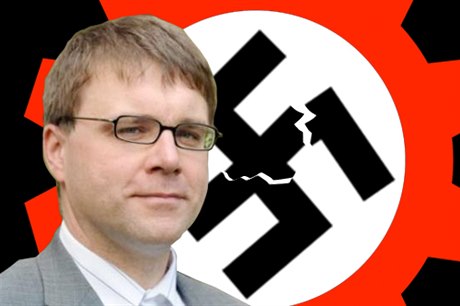Czech judicial expert on extremism Michal Mazel decided to quit his role earlier this month after a lawyer for an activist with the far-right Workers’ Party for Social Justice (DSSS) challenged his neutrality, on the grounds of Mazel’s ‘Jewish origins.’ The incident has triggered a debate on how to reform the institution of judicial experts in order to protect them from intimidation.
Mazel is proposing that academic institutions or the Czech Police’s Institute of Criminology be accredited to provide legal expertise in the field of extremism — apart from him, there are now only four other judicial experts on the subject in the Czech Republic.
However, two of thos experts, Ivo Svoboda and Josef Zouchar, and also the former judicial expert and political scientist Miroslav Mareš, told Czech Position they don’t agree with Mazel’s proposals. They say that if, for example, a university prepared a legal opinion it would have to be submitted along with the personal details of a qualified judicial expert; furthermore, a judicial expert would have to defend the opinion in court.
Accusations of partiality
‘It was better to defend myself against all that, but in doing so I ceased being impartial’Mazel says the attacks against him began in early October 2011. He then he began to ask himself whether to keep quiet and simply endure the verbal attacks and psychological pressure or to speak out. At the end of December 2011, after reading comments and allegations about himself on the Internet, he says his patience ran out.
“It was better to defend myself against all that, but in doing so I ceased being impartial. They thought it up purposely. It’s a new method of defending extremism and it’s a cunning idea,” Mazel told Czech Position.
Mazel was pushed into the media spotlight by Lucie Šlégrová, a member of the extreme right-wing DSSS who is standing trial at the Most District Court for inciting racial hatred and promoting Nazi ideology in a speech she delivered at a rally in Litvínov, northwest Bohemia. “National Socialism is the only possible way to fight against the current situation in the government,” was one of the assertions in Šlégrová’s speech, which Mazel concluded propagated Nazism and anti-Semitism.
During the trial, Šlégrová’s lawyer objected to Mazel’s opinion on the grounds that he is of Jewish origin and said Mazel was also compromised because he is “financially dependent” on police funding.
“As a person of Jewish origin, the judicial expert unarguably has a very sensitive view of the issue of the Shoah [Holocaust] and German national socialism, and like a large portion of those from the same ethnic group, he has a tendency to react with heightened sensitivity, which could lead to inappropriate personal reactions to any tendencies in this direction,” reads Šlégrová’s objection, presented by her lawyer, Petr Kočí.
A number of lawyers were perturbed by the challenge against Mazel on the grounds of his ethnicity. Constitutional Court chairman Pavel Rychetský, for example, suggested that the Czech Bar Association (ČAK) should strike him off from the directory of qualified lawyers. Although the Most court had rejected the argument of bias and another objection filed by the defense, Mazel decided to resign as judicial expert on extremism.
Mazel’s proposals
‘I didn’t work as a judicial expert on extremism because I was the leading expert on anti-Semitism and history of right-wing extremism, but because no other expert on extremism wanted to do it’ Mazel says that under the current system opinions are sought from judicial experts too readily and points out that of the 10 opinions he prepared last year, probably half did not require an expert on extremism to draft.
“Police units, the state prosecution service and judges could reach a conclusion themselves. To me it seems superfluous for a judicial expert to be called to court to deliver an appraisal of a statement that ‘all Vietnamese are animals and don’t belong here.’ If I were a policeman, I wouldn’t need another stamp to do this. It’s not work for an expert,” Mazel said.
In Mazels’s view, a judicial expert on extremism should be called in on cases in which police suspect the suspects of being active neo-Nazis, for example, if they confiscate some materials during a search and need to evaluate their meaning and significance. Far-right extremists and neo-Nazis increasingly use codes and it is sometimes problematic to ascertain whether or not a suspect is in fact an active extremist, he said.
“In such instances, an expert opinion is advantageous and can be used as supportive evidence in court against the suspect. And given that extremists are targeting judicial experts, there’s the issue of whether to leave expert assessment of extremism to individuals,” Mazel points out.
Academics and criminologists
Mazel says assigning commissions of historians, political scientists and sociologists within academic institutions would be a safe solution. Firstly, he says, not so many legal opinions on extremism are required by the police and courts, and secondly, as a commission the target of extremists’ wrath would be a group of ten or so people instead of one individual.
“I didn’t work as a judicial expert on extremism because I was the leading expert on anti-Semitism and history of right-wing extremism but because no other expert on extremism wanted to do it,” Mazel explains.
His other proposal is to use the Czech Police’s Institute of Criminology because in many criminal legal areas it is the highest instance of expert legal opinion. Mazel says a social science department that would assess extremism could also be established within the Institute. Although such a body could be accused of partiality, Mazel says nothing would prevent defendants from seeking a review. “In court it’s common for there to be a number of expert opinions. Judges must themselves evaluate what to believe more and what to believe less,” Mazel says.
Arguments against
Judicial expert Josef Zouchar points out that previously, when political scientist Miroslav Mareš was the sole judicial expert on extremism, academic ‘It’s a field in which everyone sticks their neck out and they must thus count with the consequences. Nevertheless, it’s extremely interesting work’ institutions were accredited to provide expert legal opinions and designated their academics to present and defend opinions in court. “Mareš produced opinions on behalf of an [academic] institution, and the rector then signed them. But it was Mareš who went to court. Thus it was the work of Mareš, not the institution, and it only appeared that the judicial expert was anonymous,” Zouchar says.
Zouchar’s reaction to the proposal to involve the Institute of Criminology is equally negative. “Especially given the current economic situation I can’t see a justification for such a reform,” he explained.
While Zouchar, Ivo Svoboda and former judicial expert Mareš all reject Mazel’s proposals, they do not agree on what should be done about the current state of affairs.
Mareš says the current system of producing opinions for each case is not effective. He proposes writing up methods, guidelines and case notes for the organs involved in criminal proceedings that would assist police and judges to comprehend current trends and manifestations of extremism and how extremist groups in the Czech Republic work.
Risk as part of the job
On the other hand, Zouhar and Svoboda believe that there will always be a certain element of risk involved in working as a judicial expert and that no reforms could completely eliminate those risks without endangering the right to a fair trial.
“It’s a field in which everyone sticks their neck out and so they must count on the consequences. Nevertheless, it’s extremely interesting work that helps courts when deliberating on verdicts and punishments,” Zouhar says, adding that it is not only judicial experts on extremism who are prone to attacks: there have been cases of experts who have delivered opinions on road accidents, for example, being intimidated and threatened. Zouhar therefore proposes providing special personal protection for judicial witnesses, who may be targeted due to their work. ‘I would be very wary about this. Despite everything that goes on, it’s necessary to maintain the right to a fair trial.’
By contrast, Svoboda suggests concealing the identity of judicial experts in the same way that in certain cases witnesses testify in anonymity. But his colleagues reject this proposal. “I would be very wary about this. Despite everything that goes on, it’s necessary to maintain the right to a fair trial,” Mareš told Czech Position.
Expert on extremism and political scientist Zdeněk Zbořil does agree with Mazel’s proposals, but that is hardly surprising: “All the proposals that Mr. Mazel is now putting forward are actually my proposals from almost 10 years ago. Back then, however, as the head of the Interior Ministry’s political department, Mr. Mazel staunchly opposed them because for him they weren’t financially advantageous. And that’s why he wanted independence and nomination by the ministry. Now, when the Minister [Jan Kubice] wants to tighten and more precisely define remuneration, Mazel has different opinions,” Zbořil says.
See related articles: Czech far-right activist’s lawyer may face discipline over ‘Jewish expert’ case and Extremist’s lawyer claims judicial expert compromised by Jewish origin




